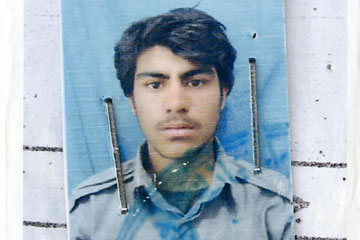
This photocopy of an image of Abdul Razaq, the killer of the three Marines, was given to the writer by a Marine in Helmand.
(8 of 12)
Five days before the murders, Asadullah, some of his police, Captain Haider and five or six of his Marines leave their guns on the bank of the Helmand River and swim. The river water is an enormous relief from the gunmetal heat. Abdul Razaq watches, on guard duty. The Marines usually seem twice the size of the Afghans, alien in all their gear. Without it they are more human, and Razaq can see the common anatomy. Still, the Marines are muscular, massive, the Afghans often frail by comparison. Like the weapons at Abdul Razaq's feet: the Afghans' old Kalashnikovs, the Americans' finely oiled rifles. The Marines' cell phones, too, seem light-years ahead of Abdul Razaq's red Nokia. But they do the same thing. Even when his Roshan SIM card doesn't work out there, he can switch it for AWCC, the national wireless company, and get reception, no problem. He can make calls, make plans.
Aug. 9, 2012. Abdul Razaq wakes up as light seeps over the Helmand horizon. The generators hum beneath the fading stars, and he and Asadullah and the rest of their team wash, pray and then go back to sleep until 9. When Abdul Razaq wakes again, he goes to his post without breakfast. The morning is uneventful. Some local police come to visit Asadullah, asking for bullets. At noon Abdul Razaq and Asadullah both return to their room to sleep away the hottest part of the day. Around 2, Asadullah wakes to a hand on his shoulder. It is Captain Haider, who wants to discuss the shura he has planned for that evening. He instructs Asadullah to ensure that all the local post commanders attend.
And I heard you brought your family up, says Captain Haider. I am happy for this.
After Captain Haider leaves, Asadullah decides to have the message about the shura delivered to the commanders in person. He sends Abdul Razaq, who sets off to visit the bases of Sangin. Many are ragged. Gates hang ajar, walls crumble. Sometimes live IEDs are stored next to mud toilets. Sometimes uniformed police drink tea in their damp, unlit chambers; other times they desert. On the roads that Abdul Razaq travels, IEDs and gunfights are common, and in the fields beyond, the opium trade flourishes. Many of the police--local and national--are drug addicts, prone to selling their equipment and even allying with the insurgents. The insurgency blooms.
Captain Haider hosts a shura every week. That Thursday at around 9 o'clock, some 40 elders pass through the metal gate to a tent in the corner of his base. The Marines do not search them. They provide water, Pepsi, cake. Relationships are key. Better not to disrespect the elders with a body search. The elders appreciate it. Captain Haider is the most dangerous man in the village, and he shows them respect. He wants to know if anyone has suspicions about the local police. If the elders will identify the bad recruits, Captain Haider and his Marines will investigate and if necessary get rid of them. His men have set up a projector and flash pictures of men on the wall. The elders call out three or four over the course of the slide show.
